Ibn al-Shaykh al-Libi was a Libyan national captured in Afghanistan in November 2001 after the fall of the Taliban; he was interrogated by American and Egyptian forces. The information he gave under torture to Egyptian authorities was cited by the George W. Bush administration in the months preceding its 2003 invasion of Iraq as evidence of a connection between Saddam Hussein and al-Qaeda. That information was frequently repeated by members of the Bush administration, although reports from both the Central Intelligence Agency (CIA) and the Defense Intelligence Agency (DIA) strongly questioned its credibility, suggesting that al-Libi was "intentionally misleading" interrogators.
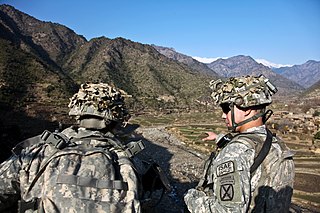
Operation Enduring Freedom (OEF) was the official name used by the U.S. government for both the first stage (2001–2014) of the War in Afghanistan (2001–2021) and the larger-scale Global War on Terrorism. On 7 October 2001, in response to the September 11 attacks, President George W. Bush announced that airstrikes against Al-Qaeda and the Taliban had begun in Afghanistan. Beyond the military actions in Afghanistan, Operation Enduring Freedom was also affiliated with counterterrorism operations in other countries, such as OEF-Philippines and OEF-Trans Sahara.

Jemaah Islamiyah was a Southeast Asian Islamist militant group based in Indonesia, which was dedicated to the establishment of an Islamic state in Southeast Asia. On 25 October 2002, immediately following the JI-perpetrated 2002 Bali bombings, JI was added to the UN Security Council Resolution 1267.
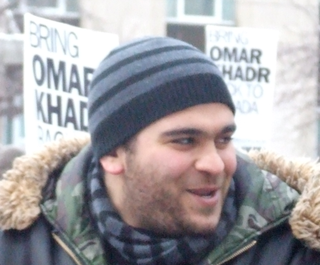
Abdurahman Ahmed Said Khadr is a Canadian citizen who was held as an enemy combatant in extrajudicial detention in the United States Guantanamo Bay detainment camps, in Cuba, after being detained in 2002 in Afghanistan under suspicion of connections to Al-Qaeda. He later claimed to have been an informant for the CIA. The agency declined to comment on this when asked for confirmation by the United States' PBS news program Frontline. He was released in the fall of 2003 and ultimately returned to Canada.

The Singapore embassies attack plot was a plan in 2001 by Jemaah Islamiyah (JI) to bomb the diplomatic missions and attack personnel of the United States, Australia, the United Kingdom, and Israel based in Singapore. There were also several other targets. The plot was uncovered in December 2001 and as many as 15 people were arrested in Singapore within a month. Further investigation and intelligence prompted the detention of another 26 persons from 2002 to 2005. As of 2006, 37 of them were still being detained without trial, under the Internal Security Act. Four had been released on restriction orders.

Fazul Abdullah Mohammed was a Comorian-Kenyan member of al-Qaeda, and the leader of its presence in East Africa. Mohammed was born in Moroni, Comoros Islands and had Kenyan as well as Comorian citizenship. He spoke French, Swahili, Arabic, English, and Comorian.

A suicide bomber detonated a car bomb outside the lobby of the JW Marriott Jakarta hotel on 5 August 2003, killing 12 people and injuring 150. Those killed included 11 Indonesians and one Dutch national. The hotel was viewed as a Western symbol, and had been used by the United States embassy for various events. The hotel was closed for five weeks and reopened to the public on 8 September 2003.
Hamed Abderrahman Ahmad, also known as Ahmad Abd al Rahman Ahmad, is a Spanish national born in Ceuta, who was captured and arrested by Pakistani soldiers in Pakistan in the fall of 2001 during the United States intervention in Afghanistan. He was transferred to United States military custody and held at Guantanamo Bay detention camp as a suspected enemy combatant from early 2002 to February 14, 2004, the only Spanish citizen to be detained there. His internment serial number (ISN) was 267.

Abu Ayyub al-Masri, also known as Abu Hamza al-Muhajir, born Abdel Moneim Ezz El-Din Ali Al-Badawi, was an Egyptian militant leader who was the leader of Al-Qaeda in Iraq during the Iraqi insurgency, following the death of Abu Musab al-Zarqawi in June 2006. He was war minister of the Islamic State of Iraq from 2006 to 2010 and prime minister of the Islamic State of Iraq from 2009 to 2010. He was killed during a raid on his safehouse on 18 April 2010.
During the 2001 Invasion of Afghanistan, many Taliban, al-Qaeda and militant fighters were captured and held at military bases in the region. On several occasions, there were instances of mass escapes.
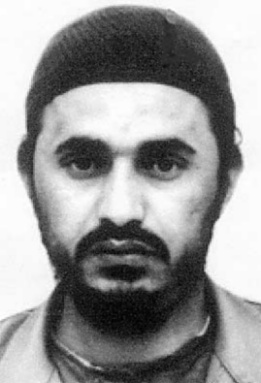
Abu Musab al-Zarqawi, born Ahmad Fadeel al-Nazal al-Khalayleh, was a Jordanian militant jihadist who ran a training camp in Afghanistan. He became known after going to Iraq and being responsible for a series of bombings, beheadings, and attacks during the Iraq War, reportedly "turning an insurgency against US troops" in Iraq "into a Shia–Sunni civil war". He was sometimes known by his supporters as the "Sheikh of the slaughterers".

The war on terror, officially the Global War on Terrorism (GWOT), is a global counterterrorist military campaign initiated by the United States following the September 11 attacks of 2001, and is the most recent global conflict spanning multiple wars. Some researchers and political scientists have argued that it replaced the Cold War.
Carried out by the Egyptian Islamic Jihad, the 19 November 1995 attack on the Egyptian embassy in Islamabad, Pakistan was retaliation against the diplomatic staffers who were accused of gathering intelligence on Jihad factions inside Pakistan. It was the deadliest attack against the Egyptian government, since it had been declared apostate three years earlier by Islamic militants.
Abdul Rahman Jabarah was a Canadian killed in a July 2003 firefight with Saudi Arabian officials who believed he was involved in the Riyadh compound bombings by al-Qaeda.
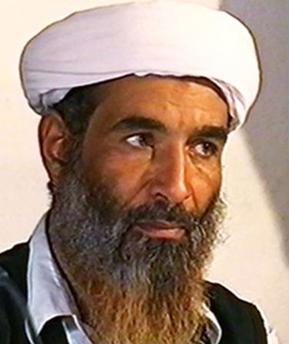
Mohammed Atef was an Egyptian militant and prominent military chief of al-Qaeda, and a deputy of Osama bin Laden, although Atef's role in the organization was not well known by intelligence agencies for years. He was killed in a US airstrike in November 2001.
The Egyptian Islamic Jihad, formerly called simply Islamic Jihad and the Liberation Army for Holy Sites, originally referred to as al-Jihad, and then the Jihad Group, or the Jihad Organization, was an Egyptian Islamist group active from the late 1970's until its 2001 merger with Al-Qaeda. It was long considered an affiliate of Al-Qaeda and under worldwide embargo by the United Nations. It was also banned by several individual governments worldwide. The group is a proscribed terrorist group organization in the United Kingdom under the Terrorism Act 2000.
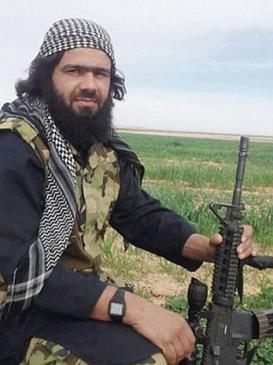
Shaker Wahib al-Fahdawi al-Dulaimi, better known as Abu Waheeb, was an Iraqi militant jihadist who was the leader of the Islamic State in Anbar, Iraq. He killed three Syrian truck drivers in Iraq in the summer of 2013, and was himself killed, with three others, in a United States-led coalition airstrike in May 2016, according to the US Department of Defense.

Samir Hijazi, known as Abu Humam al-Shami or Faruq al-Suri, is a Syrian militant and soldier who was the military chief of al-Qaeda's Syrian affiliate al-Nusra Front. He became the head of the Hurras al-Din in February 2018, though he was replaced by Khalid al-Aruri.












